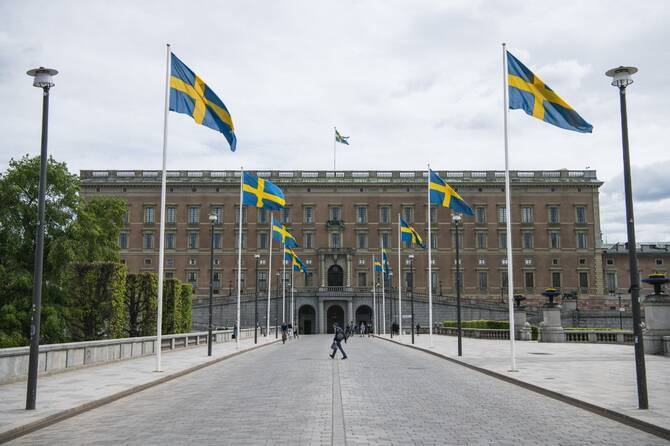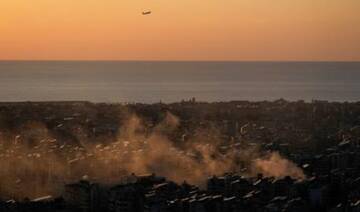LIMA, Peru: Diplomats from a dozen Latin American countries and Canada on Friday urged President Nicolas Maduro to abstain from being sworn in for a second term and cede power until new elections can be held, saying it is the only way to restore democracy in Venezuela.
The strong rebuke from the Lima Group urging Maduro to hand over power to the opposition-controlled National Assembly comes days before his Jan. 10 inauguration to a six-year term widely rejected as illegitimate.
Even before announcing its decision, the gathering in Peru’s capital prompted a sharp response from Venezuela’s Foreign Minister Jorge Arreaza, who said the coalition is taking orders directly from US President Donald Trump, which Caracas frequently accuses of spearheading an economic war against the country.
“What a display of humiliating subordination!” Arreaza said on Twitter.
A once-wealthy oil nation, Venezuela is in crisis after two decades of socialist rule, marked by hyperinflation that makes it difficult for people to afford scarce food and medicine. An estimated 2.3 million Venezuelans have migrated from their country since 2015, according to the United Nations.
The Lima Group formed more than a year ago to advocate for a solution to Venezuela’s crisis that threatens regional instability.
Immediately following Maduro’s May 20 re-election, the coalition said it refused to recognize the results, decrying the vote as failing to meet “international standards of a democratic, free, just and transparent process.”
Argentina, Brazil, Colombia and Mexico are among the group’s members. Peruvian Foreign Minister Nestor Popolizio recently had said his country would propose that Lima Group members break diplomatic relations with Venezuela.
However, the political make-up of the coalition has recently shifted, most notably in Mexico.
The newly elected government of Mexican President Andres Manuel Lopez Obrador is a member of the coalition but abstained from the vote.
His administration has adopted a policy of non-intervention, and Maduro traveled to Obrador’s inauguration, meeting privately with the new Mexican leader.
The United States is not formally a member of the Lima Group, but US Secretary of State Mike Pompeo participated in the meeting via video conference.
It follows Pompeo’s recent visit to Latin America during which he attended the inauguration of Brazil’s President Jair Bolsonaro and then stopped in Colombia to meet with President Ivan Duque. Both Bolsonaro and Duque signaled a united stance against Maduro’s government aligned with the United States.
The Trump administration considers Maduro’s government a “dictatorship,” sanctioning roughly 70 top officials and blocking US banks from doing business with Venezuela, putting a financial strangle-hold on the cash-strapped country.
Geoff Ramsey, a Venezuela researcher at the Washington Office on Latin America, called the optics of Pompeo’s presence in Friday’s meeting “terrible.”
The Lima Group was created to showcase regional concern for the crisis among Latin American countries and Pompeo’s involvement furthers a perception that the US has been quietly directing its moves, he said.
Rather, the coalition should push for neutral actors to open dialogues between Maduro’s government and opposition leaders, finding ways to reduce mounting international pressure and reaching a peaceful resolution in Venezuela, Ramsey said.
“I think what the region needs to do now is to be part of the solution and not part of the problem,” Ramsey said. “Isolating the government and continuing to pile on the pressure without channeling some kind of productive release hasn’t produced productive results.”
Foreign diplomats urge Venezuela’s Maduro to hand over power
Foreign diplomats urge Venezuela’s Maduro to hand over power

- The strong rebuke from the Lima Group urging Maduro to hand over power to the opposition-controlled National Assembly comes days before his Jan. 10 inauguration
- A once-wealthy oil nation, Venezuela is in crisis after two decades of socialist rule, marked by hyperinflation
Swedish intelligence warns of increased Middle East war fallout

- “The threat has increased primarily against American, Jewish, Israeli interests or opposition figures” Hallstrom told AFP
- Hallstrom also said the war in the Middle East could have “considerable impact” on European security
STOCKHOLM: A top Swedish intelligence official on Thursday warned of increased threats against American and Israeli interests, as well as Iranian dissidents, in Sweden because of the war in the Middle East.
The Scandinavian country’s security, which had already deteriorated after Russia’s invasion of Ukraine, has worsened since the US-Israeli strikes on Iran on Saturday unleashed a new war, according to Fredrik Hallstrom, head of operations for the Swedish Security Service (Sapo).
“The threat has increased primarily against American, Jewish, Israeli interests or opposition figures, rather than toward Sweden as a nation or country,” Hallstrom told AFP.
“I’m talking about opposition figures with such influence that they could actually either be perceived as a serious threat to the Iranian regime, or in fact be one,” he explained.
Hallstrom also said the war in the Middle East could have “considerable impact” on European security.
Police have taken measures to increase security around potential targets, such as embassies, he said.
Sapo has previously pointed to Iran, China and Russia as the main threats to the country.
It has accused Iran in particular of recruiting members of Swedish criminal gangs to commit “acts of violence” against Israeli and other interests in Sweden — a claim Iran denied.
Other risks highlighted by Sapo include increased intelligence activities in Sweden, surveillance and actions targeting Iranian dissidents in exile, as well as the acquisition of equipment, research and know-how that could contribute to the development of nuclear weapons.
“We know that Iran uses cyberattacks and hacks phones and computers in order to monitor others,” Hallstrom said.
He added that this monitoring could be potentially used to get individuals “in Sweden to provide information about other people, by exerting pressure.”













